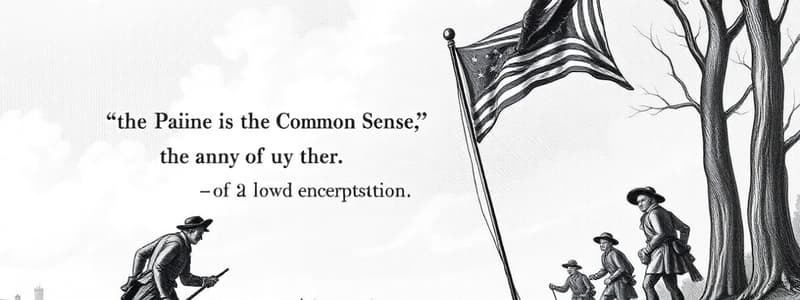Podcast
Questions and Answers
What significant change occurred with the Virginia law of 1662 regarding slavery?
What significant change occurred with the Virginia law of 1662 regarding slavery?
- It abolished the practice of indentured servitude.
- It established that children of enslaved mothers would also be enslaved. (correct)
- It allowed free Blacks to own white slaves.
- It enabled slaves to sue for their freedom.
What privileges did free Blacks have in Virginia and Maryland during the early 1600s?
What privileges did free Blacks have in Virginia and Maryland during the early 1600s?
- They were exempt from all taxes.
- They could not associate with white individuals.
- They were allowed to vote in local elections.
- They could own land and participate in court proceedings. (correct)
How did the status of free Blacks and their rights change over time?
How did the status of free Blacks and their rights change over time?
- They were allowed to form their own governments.
- They gained equal rights to white landowners permanently.
- They began to exclude whites from their communities.
- They had fewer privileges as racial distinctions became entrenched. (correct)
What does the term 'partus sequitur ventrem' refer to in the context of slavery?
What does the term 'partus sequitur ventrem' refer to in the context of slavery?
Which statement accurately reflects Anthony Johnson's unique position in early Virginia society?
Which statement accurately reflects Anthony Johnson's unique position in early Virginia society?
What did Thomas Paine argue would happen to the colonists if they remained part of the British Empire?
What did Thomas Paine argue would happen to the colonists if they remained part of the British Empire?
According to Thomas Paine, what opportunity arose from the colonists' separation from Britain?
According to Thomas Paine, what opportunity arose from the colonists' separation from Britain?
Which gradual emancipation law allowed male children born to slave mothers after a specific date to gain freedom at age 28?
Which gradual emancipation law allowed male children born to slave mothers after a specific date to gain freedom at age 28?
What was a common characteristic of the gradual emancipation laws in the Northern states?
What was a common characteristic of the gradual emancipation laws in the Northern states?
What was the significance of the 1830 census regarding slavery in the North?
What was the significance of the 1830 census regarding slavery in the North?
Which of the following pairs female children born to slave mothers with their respective legal freedom age according to New York's 1799 law?
Which of the following pairs female children born to slave mothers with their respective legal freedom age according to New York's 1799 law?
What was Robert Carter III known for in relation to slavery?
What was Robert Carter III known for in relation to slavery?
What did the last paragraph of Common Sense propose for the American colonists?
What did the last paragraph of Common Sense propose for the American colonists?
Flashcards
Hereditary Slavery Law of 1662
Hereditary Slavery Law of 1662
A 1662 Virginia law established hereditary slavery, meaning that children born to enslaved mothers would also be enslaved for life, regardless of their father's status.
Partus Sequitur Ventrem
Partus Sequitur Ventrem
A legal principle stating that children inherit the status of their mother, which was used to solidify hereditary slavery in Virginia.
Privileges of Free Blacks in Early Virginia and Maryland
Privileges of Free Blacks in Early Virginia and Maryland
Free Black people in the early 17th century in Virginia and Maryland possessed certain rights, such as owning land, filing lawsuits, and participating in some aspects of colonial society.
Anthony Johnson's Story
Anthony Johnson's Story
Signup and view all the flashcards
Richard Carter III and Gradual Emancipation
Richard Carter III and Gradual Emancipation
Signup and view all the flashcards
Why did Paine believe colonists needed to separate from Britain?
Why did Paine believe colonists needed to separate from Britain?
Signup and view all the flashcards
What did Paine envision for the future of America after independence?
What did Paine envision for the future of America after independence?
Signup and view all the flashcards
How did the American Revolution impact slavery?
How did the American Revolution impact slavery?
Signup and view all the flashcards
What did the Gradual Emancipation Laws (Pennsylvania 1780, New York 1799, New Jersey 1804) reveal?
What did the Gradual Emancipation Laws (Pennsylvania 1780, New York 1799, New Jersey 1804) reveal?
Signup and view all the flashcards
How did the Gradual Emancipation Laws prevent slavery from quickly ending in the North?
How did the Gradual Emancipation Laws prevent slavery from quickly ending in the North?
Signup and view all the flashcards
How did the gradual nature of emancipation manifest in the North?
How did the gradual nature of emancipation manifest in the North?
Signup and view all the flashcards
What is voluntary manumission?
What is voluntary manumission?
Signup and view all the flashcards
How did the New York Gradual Emancipation Law of 1799 work?
How did the New York Gradual Emancipation Law of 1799 work?
Signup and view all the flashcards
Study Notes
Paine's Reasons for Colonial Separation
- Paine argued that remaining in the British Empire would lead to conflict.
- Paine believed independence would allow for a better government system.
- Paine envisioned a new, politically just order through separation.
- Paine, in Common Sense, advocated for a new system of government.
Gradual Emancipation Laws
- Pennsylvania (1780), New York (1799), and New Jersey (1804) enacted gradual emancipation laws.
- These laws aimed to balance revolutionary ideals with property rights, but did not ensure immediate freedom.
- Gradual emancipation laws, while intended to phase out slavery, did not promptly eliminate it in the North.
- Despite these laws, the 1830 census revealed 3,500 slaves in the North. Connecticut's last slaves were freed in 1848, and 18 elderly slaves remained in New Jersey in 1860.
Specific Provisions of Gradual Emancipation Laws
- New York (1799): Male children born to enslaved mothers after July 4, 1799, were free at age 28; female children, at 25.
- New Jersey (1804): Male children born after July 4, 1804, gained freedom at 25; females at 21.
- Pennsylvania (1780): Male children born after 1780 gained freedom at 28; females at 21.
Voluntary Manumission and Robert Carter III
- Robert Carter III, a wealthy Virginian, provided for the gradual emancipation of over 400 enslaved people.
Anthony Johnson and Race/Ownership in the 1600s
- Anthony Johnson, a formerly enslaved person, became a slave owner and landowner in the early 1600s, illustrating the complexities of race and ownership during that period.
- Anthony Johnson shows how a former slave could attain ownership of land and slaves.
Free Blacks' Privileges (1600s)
- Free blacks in Virginia and Maryland could own land, sue, and participate in colonial society.
- Eventually, racial rules restricted these rights.
- In early colonial America, black and white laborers worked together.
Virginia's 1662 Law
- Virginia's 1662 law established hereditary slavery, stating that children of enslaved mothers were also enslaved.
Studying That Suits You
Use AI to generate personalized quizzes and flashcards to suit your learning preferences.



